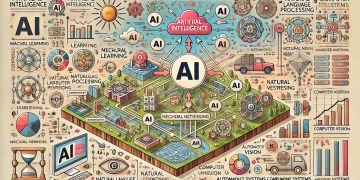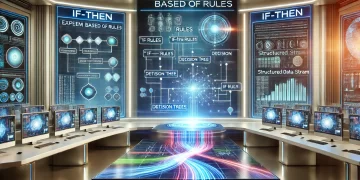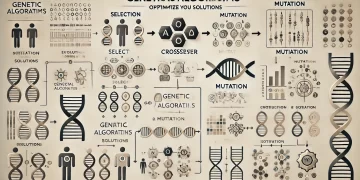Artificial Intelligence (AI) is transforming the entertainment industry by enabling advanced content creation, personalized recommendations, and immersive experiences. From movies and video games to sports analytics and interactive storytelling, AI-driven innovations are reshaping how content is produced and consumed. This article explores various AI applications in entertainment, games, sports, and movies.
1. AI in Movie Production and Scriptwriting
AI-powered tools analyze audience preferences, market trends, and storytelling patterns to assist in scriptwriting. Platforms like ScriptBook predict a movie’s success by evaluating screenplay elements. AI is also used to automate video editing, generate special effects, and enhance post-production processes.
2. AI-Generated Visual Effects (VFX)
AI enhances visual effects by automating rendering processes, generating realistic CGI characters, and improving motion capture technology. Deepfake technology is also being used to create realistic character replacements and de-aging effects in films.
3. AI in Personalized Content Recommendations
Streaming platforms like Netflix, Hulu, and Disney+ use AI-driven algorithms to analyze user behavior and provide personalized content recommendations. These AI systems help viewers discover new movies and shows based on their preferences.
4. AI in Game Development and Design
AI plays a vital role in game development by generating game environments, designing non-player characters (NPCs), and adapting gameplay based on user interactions. Procedural content generation (PCG) allows AI to create dynamic levels and in-game narratives, enhancing the player experience.
5. AI for Realistic NPCs and Enemy Behavior
Game AI enables NPCs to behave intelligently and adapt to player strategies. AI-driven NPCs can learn from players’ actions, making the gaming experience more challenging and engaging. AI is also used in multiplayer games to create bots that mimic human behavior.
6. AI in Motion Capture and Animation
AI-powered motion capture tools enhance animation by analyzing human movements and automatically translating them into digital characters. AI reduces the need for extensive manual animation, making character development faster and more cost-effective.
7. AI in Soundtrack Composition and Music Creation
AI-generated music tools, such as AIVA and Amper Music, assist composers in creating background scores for movies, games, and advertisements. AI analyzes music styles and generates compositions that fit specific moods and themes.
8. AI in Voice Acting and Dubbing
AI-driven voice synthesis technologies like Google’s WaveNet and OpenAI’s text-to-speech systems generate realistic voiceovers. AI is used in dubbing to match lip-syncing and create high-quality multilingual content for global audiences.
9. AI-Powered Virtual Reality (VR) and Augmented Reality (AR)
AI enhances VR and AR experiences by optimizing object recognition, real-time rendering, and user interaction. AI-driven VR applications provide immersive storytelling, allowing users to engage with virtual worlds dynamically.
10. AI in Sports Analytics and Performance Enhancement
AI is widely used in sports for performance analysis, injury prediction, and game strategy optimization. AI-driven data analytics tools track player movements, assess performance trends, and provide coaches with valuable insights for strategic planning. Wearable AI devices monitor athletes’ physical conditions to prevent injuries.
11. AI in Automated Sports Broadcasting
AI-powered cameras and algorithms are now capable of automatically capturing and broadcasting live sports events. These systems track the action on the field, adjust camera angles, and highlight key moments, reducing the need for manual camera operation.
12. AI in Fantasy Sports and Betting
AI-driven predictive analytics are transforming fantasy sports and sports betting. AI models analyze historical performance data, player statistics, and real-time game conditions to generate accurate forecasts and betting odds.
13. AI in Content Moderation and Copyright Protection
AI helps detect inappropriate content, piracy, and copyright violations on entertainment platforms. AI-driven moderation tools analyze and filter user-generated content to ensure compliance with community guidelines.
Conclusion
AI is revolutionizing entertainment, games, sports, and movies by streamlining production processes, enhancing creativity, and personalizing user experiences. As AI continues to evolve, its role in entertainment will expand, leading to more immersive, interactive, and engaging content for global audiences.
References
- MIT Technology Review. (2023). “The Role of AI in Film Production and Scriptwriting.”
- Forbes. (2023). “AI in Game Development: Creating Realistic NPCs and Dynamic Worlds.”
- IEEE Spectrum. (2023). “AI-Generated Music and Soundtracks in the Entertainment Industry.”
- Netflix Technology Blog. (2023). “Personalized Content Recommendations Using AI.”
- The Verge. (2023). “AI-Powered Visual Effects and Deepfake Technologies in Hollywood.”
- Game Developer Magazine. (2023). “The Future of AI in Gaming and Virtual Reality.”
- ESPN Tech Blog. (2023). “AI in Sports Analytics and Performance Tracking.”
- Sports Illustrated. (2023). “The Rise of AI in Fantasy Sports and Predictive Analytics.”




































